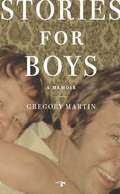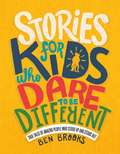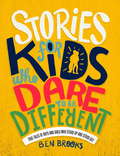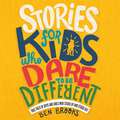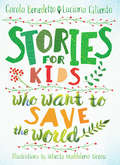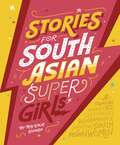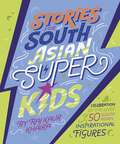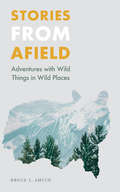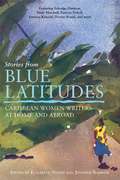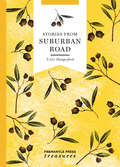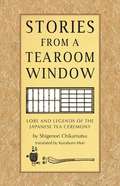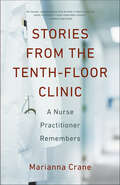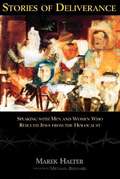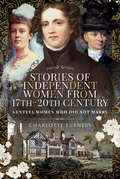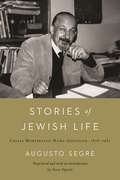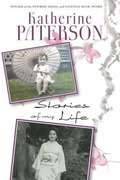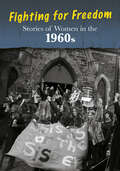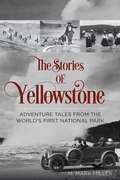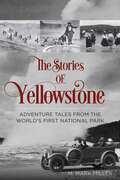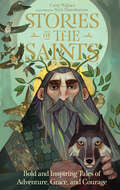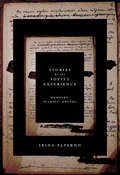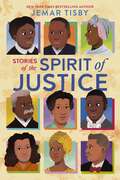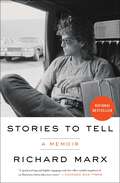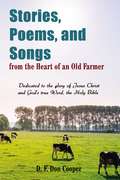- Table View
- List View
Stories for Boys: A Memoir
by Gregory MartinIn this memoir of fathers and sons, Gregory Martin struggles to reconcile the father he thought he knew with a man who has just survived a suicide attempt; a man who had been having anonymous affairs with men throughout his thirty-nine years of marriage; and who now must begin his life as a gay man. <P><P>At a tipping point in our national conversation about gender and sexuality, rights and acceptance, Stories for Boys is about a father and a son finding a way to build a new relationship with one another after years of suppression and denial are given air and light.Martin's memoir is quirky and compelling with its amateur photos and grab-bag social science and literary analyses. Gregory Martin explores the impact his father's lifelong secrets have upon his life now as a husband and father of two young boys with humor and bracing candor. Stories for Boys is resonant with conflicting emotions and the complexities of family sympathy, and asks the questions: How well do we know the people that we think we know the best? And how much do we have to know in order to keep loving them?
Stories for Kids Who Dare to Be Different: True Tales of Amazing People Who Stood Up and Stood Out (The Dare to Be Different Series)
by Ben Brooks Quinton WintorBoys will be boys and girls will be girls? Not in this book.The follow-up to Ben Brooks's New York Times bestselling Stories for Boys Who Dare to Be Different, this book offers more extraordinary true stories of amazing people who broke the mold and changed the world for the better. The resulting message? Be yourself, and your dreams might come true.With the help of Quinton Winter's striking full-color illustrations, Brooks offers an accessible compilation of 76 famous and not-so-famous influencers from the past to the present day, every single one of them a rule-breaker and stereotype-smasher in his or her own way. Entries include Emma Gonzalez, Andy Warhol, Bjork, Hans Christian Andersen, Sally Ride, and so many more -- heroes from all walks of life and from all over the world.
Stories for Kids Who Dare to be Different
by Ben Brooks"In our evermore hectic and overwhelming world, Stories for Kids Who Dare to be Different is refreshing proof that dreams do come true and that it is ok to be different. An inspiring read for any young person, particularly those struggling to find their place in the world." Megan Hine_______Björk, Dr Seuss, Whoopi Goldberg, Andy Warhol, Ellen MacArthur, Greta Gerwig, Andrea Bocelli, Hua Mulan ... these are men and women who all dared to be different. Boys will be boys and girls will be girls - or so the meaningless saying goes. Because what if you're a girl and you like cage fighting? Or you're a boy and you love ballet? And what if you've always dreamed of being a scientist but you can't see anyone who looks or sounds like you, and who has left a legacy - in the form of microscopes and Bunsen burners - for you to follow? This is the book for children who want to know about the lives of those heroes who have led the way, changing the world for the better as they go. Following the runaway success of Stories for Boys Who Dare to be Different, parents asked for a celebration of role models of both genders for boys and girls within the same book. Stories for Kids Who Dare to Be Different is the answer. These are the extraordinary stories of 100 famous and not-so-famous men and women, every single one of them an inspiring pioneer and creative genius in their own way, who broke the mould and made their dreams come true. Like Stories for Boys Who Dare to be Different, this is a beautifully illustrated, evocative and inspirational book of amazing stories of amazing people, that will delight sons and daughters, nephews and nieces, and give them the courage to be themselves.*For tales of even more brilliant people who have dared to be different, STORIES FOR BOYS WHO DARE TO BE DIFFERENT 2 is out now!*
Stories for Kids Who Dare to be Different
by Ben Brooks"In our evermore hectic and overwhelming world, Stories for Kids Who Dare to be Different is refreshing proof that dreams do come true and that it is ok to be different. An inspiring read for any young person, particularly those struggling to find their place in the world." Megan Hine_______Björk, Dr Seuss, Whoopi Goldberg, Andy Warhol, Ellen MacArthur, Greta Gerwig, Andrea Bocelli, Hua Mulan ... these are men and women who all dared to be different. Boys will be boys and girls will be girls - or so the meaningless saying goes. Because what if you're a girl and you like cage fighting? Or you're a boy and you love ballet? And what if you've always dreamed of being a scientist but you can't see anyone who looks or sounds like you, and who has left a legacy - in the form of microscopes and Bunsen burners - for you to follow? This is the book for children who want to know about the lives of those heroes who have led the way, changing the world for the better as they go. Following the runaway success of Stories for Boys Who Dare to be Different, parents asked for a celebration of role models of both genders for boys and girls within the same book. Stories for Kids Who Dare to Be Different is the answer. These are the extraordinary stories of 100 famous and not-so-famous men and women, every single one of them an inspiring pioneer and creative genius in their own way, who broke the mould and made their dreams come true. Like Stories for Boys Who Dare to be Different, this is a beautifully illustrated, evocative and inspirational book of amazing stories of amazing people, that will delight sons and daughters, nephews and nieces, and give them the courage to be themselves.*For tales of even more brilliant people who have dared to be different, STORIES FOR BOYS WHO DARE TO BE DIFFERENT 2 is out now!*
Stories for Kids Who Want to Save the World
by Carola Benedetto Luciana CilientoSixteen biographies of extraordinary people--ranging from Sebastião Salgado to Björk and Greta Thunberg--who came of age fighting climate changeEvery person has a path in life, one that is intertwined with the fate of the earth. The life stories in this collection begin and end with that realization. First, as children, in different countries and eras, they witness how humans provoke environmental degradation. Each leads a life that not only minimizes their individual contribution to climate change at a local scale, but also that of their generation on a global scale. Then, as adults, they recognize the maturity and agency acquired at that moment which defined their lives. The biographies depict concrete initiatives that contribute to climate preservation, from a physicist who promotes organic farming techniques in India to a designer that only uses ecological fabrics and dyes in Italy. Rock climber Yvon Chouinard, biologist Rachel Carson, and designer Adriana Santanocito are included in this diverse cast of environmental activists. Together they show us that regardless of culture, class, or profession it is never too early or late to find your way to improve the world our children will inhabit. The stakes couldn't be higher: "Our house is on fire," as Greta Thunberg rightly said.
Stories for South Asian Supergirls
by Raj Kaur KhairaDiscover 50 inspirational stories of South Asian women and their INCREDIBLE achievements.Featuring stories of success from award-winning entertainers Jameela Jamil and Mindy Kaling, as well as pioneering business leaders Indra Nooyi, Anjali Sud and Ruchi Sanghvi. South Asian Supergirls also features equally remarkable yet less well known figures, such as the British Muslim spy, Noor Inayat Khan.Perfect for fans of Goodnight Stories for Rebel Girls, this heartwarming read is the ideal gift for young readers.Each profile has been paired with a delightful illustration from one of ten South Asian artists, this is a book for all ages - treasured by parents and children alike.Praise for South Asian Supergirls:One of the most beautiful and visually stimulating books I've seen for a long time - The Morning StarThis call to courage celebrates warrior queens of Bangladeshi, Indian, Nepalese and Pakistani heritage - The GuardianHeartwarmingly full of the power, resilience and ingenuity of South Asian women - Book Trust
Stories for South Asian Superkids: Discover the inspirational lives of 50 figures from South Asia
by Raj Kaur KhairaDiscover the inspirational lives of 50 figures from across South Asia and their INCREDIBLE achievements from the author of Stories for South Asian Supergirls.An illustrated look at the fascinating, empowering life stories of 50 famous and under-celebrated people from India, Afghanistan, Pakistan, Bangladesh and Sri Lanka.South Asian kids will have a chance to dream about their lives for themselves that challenge the limited stereotype and narratives that are available in mainstream media.Bringing together the stories of game-changing business leaders (Bela Bajaria, Payal Kadakia, Sharmadean Reid), leading entertainers (Freddie Mercury, Riz Ahmed), award-winning authors (Khaled Hosseini, Satnam Sanghera, Salman Rushdie) and a whole host of other equally remarkable figures - from non-binary performance artist Alok V.Menon, unstoppable Chef Asma Khan and ground-breaking model Yasmeen Ghauri - this book seeks to redress the imbalance for young kids of colour by empowering them to break new ground for themselves and inspire others along the way.Beautifully illustrated with striking portraits by ten international South Asian artists, this is truly a book for all ages - a gift to be treasured by parents and children alike.Perfect for fans of Goodnight Stories for Rebel Girls, this heartwarming read is the ideal gift for young readers.Praise for the first book in the Super Series, Stories for South Asian Supergirls:There is someone here for every girl and boy — budding lawyers, climbers, film-makers and mountaineers... — The Times - Children’s Book of the WeekThis call to courage celebrates warrior queens of Bangladeshi, Indian, Nepalese and Pakistani heritage - The GuardianHeartwarmingly full of the power, resilience and ingenuity of South Asian women - Book TrustOne of the most beautiful and visually stimulating books I've seen for a long time - The Morning Star
Stories from Afield: Adventures with Wild Things in Wild Places (Outdoor Lives)
by Bruce L. SmithOver the past four decades, Bruce L. Smith has worked with most big-game species in some of the American West’s most breathtaking and challenging landscapes. In Stories from Afield, readers join Smith on his adventures as a naturalist, sportsman, and wildlife biologist, as he pulls us into the field of learning and discovery across wilderness areas of western Montana, the National Elk Refuge in Jackson Hole, Wyoming, and a South African temperate forest. Ranging from humorous to harrowing, Smith’s essays recount capturing newborn elk calves, stalking mountain goats on icy cliffs, being stranded on a mountain after riding out a helicopter crash, confrontations with bears during his research, plus quirky and edifying hunting tales. Throughout his adventures, the magnetism and danger of wild nature are ever present, reminding us that our fascination with wildness often stems from its unpredictability.
Stories from Blue Latitudes: Caribbean Women Writers At Home and Abroad
by Elizabeth Nunez Jennifer SparrowSTORIES FROM BLUE LATITUDES gathers the work of twenty-six major and emerging women fiction writers from the Caribbean. The stories are at once poignant and shocking, and shed light on a part of the world that is too often misrepresented. They deal with the sad legacy of colonialism and the ways in which race, skin color, and class complicate relationships between men and women and between parents and children. In some stories, the sexual exploitation of Caribbean girls and women becomes a metaphor for neocolonial exploitation, a biting rejoinder to enticing travel brochures that depict the Caribbean as a tropical playground for tourists. But whether writing about childhood or adulthood, about life on the islands or life abroad, these extraordinary writers express their concerns, both universal and specific, with a vibrancy that comes from lived experience and a love of a place they will always call home.
Stories from Suburban Road
by Thomas HungerfordT.A.G. Hungerford’s highly acclaimed, bestselling autobiographical short stories recount his childhood in semi-rural suburbia in the 1920s and 1930s. Bird-nesting and school days, crabbing and swimming in the Swan River, Chinese market gardens and the old corner store are all brought to life through the eyes of an inquisitive, adventurous boy.ABOUT THE FREMANTLE PRESS TREASURESTo celebrate over forty years of publishing, Fremantle Press presents the TREASURES series. These special editions of much-loved Australian stories will be a treasure for those who know them and a treat for new readers.
Stories from a Tearoom Window
by Kozaburo Mori Toshiko Mori Shigenori ChikamatsuIn the eighteenth century, the warrior Shigenori Chikamatsu set down scores of legends, anecdotes and bits of lore to express the essence of the tea ceremony for the edification of tea connoisseurs. His work became Stories from a Tearoom Window, translated into English for the first time in 1982 and now available again. With stories touching on lives of great tea masters and the core ideal of natural simplicity in the tea ceremony, Stories from a Tearoom Window is a charming anecdotal tour of the world of tea.
Stories from the Tenth-Floor Clinic: A Nurse Practitioner Remembers
by Marianna CraneRunning a clinic for seniors requires a lot more than simply providing medical care. In Stories from the Tenth-Floor Clinic, Marianna Crane chases out scam artists and abusive adult children, plans a funeral, signs her own name to social security checks, and butts heads with her staff—two spirited older women who are more well-intentioned than professional—even as she deals with a difficult situation at home, where the tempestuous relationship with her own mother is deteriorating further than ever before. Eventually, however, Crane maneuvers her mother out of her household and into an apartment of her own—but only after a power struggle and no small amount of guilt—and she finally begins to learn from her older staff and her patients how to juggle traditional health care with unconventional actions to meet the complex needs of a frail and underserved elderly population.
Stories of Deliverance: Speaking with Men and Women Who Rescued Jews from the Holocaust
by Marek Halter Michael BernardWhen Marek Halter was five years old, he and his family fled from the Warsaw Ghetto with the help of two Polish Catholics. Fifty-three years later, now a distinguished French writer and social commentator, Halter returned to Warsaw, and from there went on a quest across Europe, seeking out and interviewing gentiles who had risked their own lives to save the lives of Jews in Nazi-occupied Europe." "From his research with Holocaust survivors, Halter developed a list of "the Just" - those who, according to Jewish tradition, must exist in each generation in order to save the world from destruction. Halter's encounters with these heroes and with those they saved are described in a series of little stories, interspersed with his own memories and observations. These "just" men and women range from obscure peasants to such notables as former West German chancellor Willy Brandt, the post-Communist leader of Lithuania, and the present Pope. The material of this book also forms the subject of a film directed by Halter, Tzedek: The Righteous.
Stories of Independent Women from 17th–20th Century: Genteel Women Who Did Not Marry
by Charlotte FurnessExplore the lives of four elite women from British history who cast off society’s expectations to live life on their own terms.As the fight for women’s rights continues, and whilst men and women alike push for gender equality around the globe, this book aims to introduce readers to four women who, in their own way, challenged and defied the societal expectations of the time in which they lived.Some chose to be writers, some were successful businesswomen, some chose to nurture and protect, some traveled the globe, some were philanthropists. Each one made the conscious decision not to marry a man.Elizabeth Isham of Lamport Hall, Anne Robinson of Saltram, Anne Lister of Shibden Hall and Rosalie Chichester of Arlington Court. These are elite women, all connected to country houses or from noble families throughout the UK, and this book explores to what extent privilege gave them the opportunity to choose the life they wanted, thus guiding the reader to challenge their own beliefs about elite women throughout history.This book is unique in that it brings the stories of real historical women to light—some of which have never been written about before, whilst also offering an introduction to the history of marriage and societal expectations of women.Starting in 1609 and traveling chronologically up to 1949, with a chapter for each woman, this book tells their remarkable stories, revealing how strong, resilient and powerful women have always been.Praise for Stories of Independent Women from seventeenth–twentieth Century“Charlotte presents the personal histories of four women from the 17th, 18th, 19th and 20th centuries in some detail and in the context of examining their effects on the matter of gender equality. Fascinating.” —Books Monthly (UK)“Very informative, clear and quite enlightening. . . . Well done to the author Charlotte Furness.” —UK Historian
Stories of Jewish Life: Casale Monferrato-Rome-Jerusalem, 1876–1985 (Raphael Patai Series in Jewish Folklore and Anthropology)
by Augusto SegreStories of Jewish Life: Casale Monferrato-Rome-Jerusalem, 1876–1985 is an unconventional memoir—an integrated collection of short stories and personal essays. Author Augusto Segre was a well-known public figure in post–WWII Italy who worked as a journalist, educator, scholar, editor, activist, and rabbi. He begins his book with stories shaped from the oral narratives of his home community as it emerged from the ghetto era, continues with his own experiences under fascism and as a partisan in WWII, and ends with his emigration to Israel. Spanning the years 1876 (one generation after emancipation from the ghetto) to 1985 (one generation after the Shoah), Segre presents this period as an era in which Italian Jewry underwent a long-term internal crisis that challenged its core values and identity. He embeds the major cultural and political trends of the era in small yet telling episodes from the lives of ordinary people. The first half of the book takes place in Casale Monferrato—a small provincial capital in the Piedmont region in northwest Italy. The second half, continuing in Casale in the late 1920s but eventually shifting to Rome then Jerusalem, follows the experiences of a boy named Moshè (Segre’s Jewish name and his stand-in). Moshè relates episodes of Italian Jewry from the 1920s to the 1980s that portray the insidiousness of fascism as well as the contradictions within the Jewish community, especially in its post-ghetto relationship to Italian society. The painful transformation of Italian Jewry manifests itself in universal themes: the seductiveness of modern life, the betrayal of tradition, the attraction of fashionable political movements, the corrosive effects of totalitarianism, and ultimately, on the positive side, national rebirth and renewal in Israel. These themes give the book significance beyond the "small world" from which they arise because they are issues that confront any society, especially those emerging from a traditional way of life and entering the modern world. Students, scholars, and readers of Jewish history, Italian history, and fiction with an autobiographical thread will find themselves captivated by Segre’s stories.
Stories of Jews for Jesus
by Ruth RosenPresents the testimonies of twenty-three people all identifying themselves as Jewish believers in Jesus. Details the challenges they faced when discussing their faith with family and friends, the fulfillment they found, and their continuing Jewish identities--often enhanced by a decision to explore the New Testament claims of Jesus. Featured writers include Jay Seculow, Lon Solomon, Vera Schlamm, Ceil Rosen, and Carol Joseph. Relatable testimonies from people of various occupations and previous religious observances are presented, as well as an in-depth discussion of the Hebrew and New Testament Scriptures that helped them to form their conclusions about Jesus.
Stories of My Life
by Katherine PatersonFrom her childhood in China to the moment she won her first National Book Award, literary icon Katherine Paterson shares the personal stories that inspired her children's books. <P><P> Told with her trademark humor and heart, Paterson's tales reveal details about her life from her childhood with missionary parents, to living as a single woman in Japan, to raising four children in suburban Maryland with her minister husband. Read about the origins of such familiar characters as Leslie Burke and Janice Avery from Bridge to Terabithia, and go behind the scenes to the moments Katherine found out she won her many awards. Filled with personal photos and letters, this funny, heartwarming history from a legendary writer lets fans in on the making of literary classics.
Stories of Women in the 1960s: Fighting For Freedom (Women's Stories From History Ser.)
by Cath SenkerIn the 1960s, a woman’s place was seen as being in the home. She even found it hard to make a big purchase if a man wasn’t with her. African-American women faced racism daily and were given low-paid, exhausting jobs. It was time for women to stand up for equal rights and equal pay. These are the stories of four trailblazers who achieved amazing things in difficult circumstances: Betty Freidan protested at the Miss America pageant against judging women on appearance. Ella Baker helped organize Freedom Schools, where black history was taught for the first time. Barbara Castle was one of the few women members of Parliament and fought for equal pay. Mary Quant showed women they could dress for themselves and not men. Many of the rights women have today are down to their actions. They helped change society's image of women forever.
Stories of Yellowstone: Adventure Tales from the World's First National Park
by M. Mark MillerCovering the time period from 1807, when John Colter first discovered the wonders of the Yellowstone Plateau to the 1920s when tourists sped between luxury hotels in their automobiles, these tales of Wonderland come from the letters, journals, and diaries kept by early visitors and later tourists. The earliest stories recount mountain men's awe at geysers hurling boiling water hundreds of feet into the air and their encounters with the native inhabitants of the region. The latest stories reflect the "civilizing" of the park and reveal the golden age of tourist travel in the area.
Stories of Yellowstone: Adventure Tales from the World's First National Park
by Mark M. MillerCovering the time period from 1807, when John Colter first discovered the wonders of the Yellowstone Plateau to the 1920s when tourists sped between luxury hotels in their automobiles, these tales of Wonderland come from the letters, journals, and diaries kept by early visitors and later tourists. The earliest stories recount mountain men&’s awe at geysers hurling boiling water hundreds of feet into the air and their encounters with the native inhabitants of the region. The latest stories reflect the &“civilizing&” of the park and reveal the golden age of tourist travel in the area.
Stories of the Saints: Bold and Inspiring Tales of Adventure, Grace, and Courage
by Carey WallacePerforming Miracles. Facing Wild Lions. Confronting Demons. Transforming the World. From Augustine to Mother Teresa, officially canonized as St. Teresa of Calcutta, discover seventy of the best-known and best-loved saints and read their riveting stories. Meet Joan of Arc, whose transcendent faith compelled her to lead an army when the king&’s courage failed. Francis of Assisi, whose gentleness tamed a man-eating wolf. Valentine, a bishop in the time of ancient Rome, who spoke so often of Christ&’s love that his saint&’s day, February 12, has been associated with courtly love since the Middle Ages. St. Thomas Aquinas, the great teacher. Peter Claver, who cared for hundreds of thousands of people on slave ships after their voyage as captives. And Bernadette, whose vision of Mary instructed her to dig the spring that became the healing waters of Lourdes. Each saint is illustrated in a dramatic and stylized full-color portrait, and included in every entry are the saint&’s dates, location, emblems, feast days, and patronage. Taken together, these stories create a rich, inspiring, and entertaining history of faith and courage. For kids age 10 and up. A perfect gift for Confirmation.
Stories of the Soviet Experience: Memoirs, Diaries, Dreams
by Irina PapernoBeginning with glasnost in the late 1980s and continuing into the present, scores of personal accounts of life under Soviet rule, written throughout its history, have been published in Russia, marking the end of an epoch. In a major new work on private life and personal writings, Irina Paperno explores this massive outpouring of human documents to uncover common themes, cultural trends, and literary forms. The book argues that, diverse as they are, these narratives-memoirs, diaries, notes, blogs-assert the historical significance of intimate lives shaped by catastrophic political forces, especially the Terror under Stalin and World War II. Moreover, these published personal documents create a community where those who lived through the Soviet era can gain access to the inner recesses of one another's lives.This community strives to forge a link to the tradition of Russia's nineteenth-century intelligentsia; thus the Russian "intelligentsia" emerges as an additional implicit subject of this book. The book surveys hundreds of personal accounts and focuses on two in particular, chosen for their exceptional quality, scope, and emotional power. Notes about Anna Akhmatova is the diary Lidiia Chukovskaia, a professional editor, kept to document the day-to-day life of her friend, the great Russian poet Anna Akhmatova. Evgeniia Kiseleva, a barely literate former peasant, kept records in notebooks with the thought of crafting a movie script from the story of her life. The striking parallels and contrasts between these two documents demonstrate how the Soviet state and the idea of history shaped very different lives and very different life stories.The book also analyzes dreams (most of them terror dreams) recounted in the diaries and memoirs of authors ranging from a peasant to well-known writers, a Party leader, and Stalin himself. History, Paperno shows, invaded their dreams, too. With a sure grasp of Russian cultural history, great sensitivity to the men and women who wrote, and a command of European and American scholarship on life writing, Paperno places diaries and memoirs of the Soviet experience in a rich historical and conceptual frame. An important and lasting contribution to the history of Russian culture at the end of an epoch, Stories of the Soviet Experience also illuminates the general logic and specific uses of personal narratives.
Stories of the Spirit of Justice
by Jemar TisbyNew York Times bestselling author Jemar Tisby collects the true, impactful stories of figures from across history—from the well-known to those often forgotten—who resisted racism and created a legacy of hope and perseverance. Each short biography is paired with an illustration to help inspire young readers to continue to work toward justice today.We are living in the civil rights movement of our day. But the challenges of the present call us to remember the past. Throughout American history, there has always been a resilient group of people who, motivated by their faith, resisted oppression and pushed for greater equality and liberty for all. From well-known figures like Dr. Martin Luther King Jr., Rosa Parks, and Harriet Tubman, to those time has nearly forgotten, all these people tapped into an abiding spirit of justice to pursue the dignity of all people.Stories of the Spirit of Justice is the companion book for young readers ages 8-12 to Jemar Tisby&’s The Spirit of Justice and tells the story of the justice movement through short biographies of the figures who did the work. With illustrations depicting the people profiled and practical tips connecting readers to the continued fight for justice, this is essential reading for everyone who still dreams of a land where all are truly free.Stories of the Spirit of Justice:covers the colonial era to the present dayincludes inspiring takeaways from each person&’s life and a bibliography for further readingroots each story in the historical moment, with descriptions of the state of justice in different eras in American historycan be used by families and church or school groups to start meaningful conversations with kids
Stories to Tell: A Memoir
by Richard Marx*National Bestseller* Legendary musician Richard Marx offers an enlightening, entertaining look at his life and career.Richard Marx is one of the most accomplished singer-songwriters in the history of popular music. His self-titled 1987 album went triple platinum and made him the first male solo artist (and second solo artist overall after Whitney Houston) to have four singles from their debut crack the top three on the Billboard Hot 100. His follow-up, 1989&’s Repeat Offender, was an even bigger smash, going quadruple platinum and landing two singles at number one. He has written fourteen number one songs in total, shared a Song of the Year Grammy with Luther Vandross, and collaborated with a variety of artists including NSYNC, Josh Groban, Natalie Cole, and Keith Urban. Lately, he&’s also become a Twitter celebrity thanks to his outspokenness on social issues and his ability to out-troll his trolls. In Stories to Tell, Marx uses this same engaging, straight-talking style to look back on his life and career. He writes of how Kenny Rogers changed a single line of a song he&’d written for him then asked for a 50% cut—which inspired Marx to write one of his biggest hits. He tells the uncanny story of how he wound up curled up on the couch of Olivia Newton-John, his childhood crush, watching Xanadu. He shares the tribulations of working with the all-female hair metal band Vixen and appearing in their video. Yet amid these entertaining celebrity encounters, Marx offers a more sobering assessment of the music business as he&’s experienced it over four decades—the challenges of navigating greedy executives and grueling tour schedules, and the rewards of connecting with thousands of fans at sold-out shows that make all the drama worthwhile. He also provides an illuminating look at his songwriting process and talks honestly about how his personal life has inspired his work, including finding love with wife Daisy Fuentes and the mystery illness that recently struck him—and that doctors haven&’t been able to solve. Stories to Tell is a remarkably candid, wildly entertaining memoir about the art and business of music.
Stories, Poems, and Songs from the Heart of an Old Farmer: Dedicated to the glory of Jesus Christ and GodÆs true Word, the Holy Bible
by Don CooperThis book is a compilation of stories, poems, and song lyrics which really do come from the heart of a former dairy farmer who sincerely desires to share his love for Jesus and God's true Word, the Holy Bible, with you. It tells of our faith and experiences during our time as dairy farmers and how those two intertwined."Dedicated to glory of Jesus Christ and God&’s True Word, the Holy Bible" is Don's mission statement, and throughout all of his writings he tells how the Lord has been at his side throughout his whole life. Without His presence Don could have never done the seemingly impossible things he's done.
